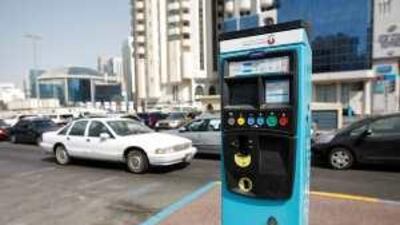Abu Dhabi // The introduction of parking fees on city centre streets is a shot in the dark, one of the new system's designers said yesterday. Charges and fines could evolve based on observation and feedback, said Peter Guest, a parking consultant from Britain, who arrived in Abu Dhabi in 2006 and drafted the initial parking plan for the island.
For now, drivers in the pay zones must feed Dh2 to Dh3 per hour into meters or - if they are residents - buy a Dh800 (US$218) annual parking permit to use one of 75,000 spaces being rolled out over the next 2½ years. But officials have to wait and see if the charges will have the desired effect of freeing up spaces and getting rid of illegally parked vehicles. "The thing about tariffs is, when you go from nothing to something, you shoot in the dark," said Mr Guest, who no longer works for the Government.
"For the public, understanding for the first time that you now have to pay for something that you've had for free is the most difficult step to take. It is not necessarily a bad thing to make that first step a gentle one." The long-expected programme was launched on Sunday. Initially, charges will apply in an area from Liwa to Baniyas streets and from Hamdan to Khalifa streets. Yesterday, parking enforcement officers handed out flyers and explained to motorists that the days of parking haphazardly down the middle of roads or on pavements were about to end.
On Saturday, those same officers will fine drivers who park illegally, passing on photographic evidence of more serious violations to police, who will register the offences and hand out demerit points. Repeat offenders will have their vehicles towed away. In the coming months, the Department of Transport, which took over responsibility for the programme last year, will review how things are going before moving on to the next stages of the programme.
"The whole reason for making this project roll out zone by zone is because it is inevitably a learning exercise," Mr Guest said. "There is going to be a refinement process. It doesn't meant that what they are doing is wrong - it means you get it in the ballpark and then you refine the thing." This could include revising the meter rates, which are Dh3 per hour on main streets and Dh2 on side streets, higher than in Dubai, where rates start as low as Dh1 and rise with by the hour.
In San Francisco, which recently changed its fee structure, motorists pay $3.50 an hour to park in the city centre, $3 to park on its periphery and $1.50 in other areas. Each household in a resident parking-permit area can purchase up to four permits for $76 each per year. Yesterday, some cars had parking tickets on their front windows. Many had a brochure for Mawaqif, the name of the parking programme, tucked under their windscreen wipers. But there were still cars parked on streets that marked yellow and white, signifying no parking, and in a loading-only zone.
The flyers reminded residents to buy parking permits from a customer service centre on Hamdan Street, near Salam Street. An additional permit costs Dh1,200. It said building owners and tenants or their next of kin were eligible for permits, up to a maximum of two per person, who must provide proof of residency. Mr Guest said that although the regulations would clearly affect families with more than two vehicles, the two-permit limit was designed to accommodate about 90 per cent of cases. The parking programme's website, www.mawaqif.ae, came online yesterday, though some of the links, including the one listing all possible violations, were not working.
Najib al Zarooni, director of parking for the department, was not available for comment. mchung@thenational.ae * The National, with additional reporting by Megan Detrie

